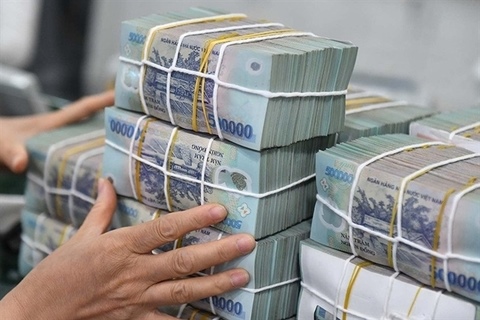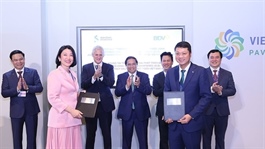VCCI proposes removing draft regulation on loan interest expense cap
VCCI proposes removing draft regulation on loan interest expense cap
Management authorities should not try to restrict the thin capitalisation of domestic enterprises by applying a loan interest expense cap regulation, the Vietnam Chamber of Commerce and Industry (VCCI) said.

A bank teller counts cash at a transaction office in Hà Nội. The loan interest expense cap regulation under the draft decree is believed to adversely impact enterprises and the ability to form economic groups in the country. — Photo nguoiduatin.vn |
The Ministry of Finance (MoF) is collecting comments on a draft decree that amends and supplements Decree 132/2020/NĐ-CP on tax management for enterprises with associated transactions.
Under a written proposal sent to the MoF, the VCCI said the loan interest expense cap regulation under the draft decree will have adverse impacts on enterprises and the ability to form economic groups in the country.
According to the VCCI, the thin capitalisation means that an enterprise operates mainly on borrowing capital, which causes its ratio of loan capital to equity too high. Limiting the thin capitalisation of enterprise will help ensure financial security, and avoid large enterprises from borrowing too much and easily losing liquidity.
However, the VCCI believes that the loan interest expense cap regulation is unreasonable and causes many negative impacts on Vietnamese enterprises, especially large one, as the thin capitalisation is common and necessary in the early stage of industrialisation in developing countries.
The VCCI explained in fact, in developing countries with late industrialisation, growth motivation depends heavily on the ability to reduce product costs that is based on capital accumulation and more flexible management. Accordingly, enterprises must rely heavily on loans and the assistance of lenders to enhance corporate governance capacity and reduce costs. As financial markets not being truly transparent in late industrialisation countries, enterprises there depend more on loans than their counterparts in early industrialisation countries.
Therefore, the VCCI suggests the application of anti-thin capitalisation rule of developed countries needs to be considered more carefully in Việt Nam.
Besides, the VCCI was also concerned the loan interest expense cap regulation also negatively impacts the formation of domestic economic groups and their motivation to invest in risky fields.
According to the VCCI, normally, when a subsidiary wants to invest in a risky field, its parent company will borrow from banks and then re-lend it to the subsidiary. This is an associated transaction and is subject to the loan interest expense cap regulation.
Therefore, the VCCI requested the drafting agency to exempt the regulation for associated transactions between domestic enterprises with the same tax payment.
In addition, in the proposal sent to the MoF, the VCCI also said the regulation on loan interest expense of enterprises with associated transactions must not exceed 30 per cent of total net profit is unreasonable.
According to the VCCI, at the end of 2022 and early 2023, due to macroeconomic uncertainties, interest rates in the market increased sharply which caused interest costs of many enterprises to surge beyond 30 per cent. Enterprises still had to pay banks for the interest costs that exceeded the 30 per cent rate, and the costs were not considered a deductible expense when calculating taxes. Therefore, despite suffering large losses due to a sharp increase in interest costs paid to banks, many enterprises reported to the VCCI that they still had to pay corporate income tax to the State.
The MoF has recently proposed to amend in the direction of excluding the determination of affiliated relationships when banks do not participate in operating, controlling, contributing capital or investing in borrowed enterprises. It means enterprises may not be subject to the 30 per cent interest cost cap regulation if banks that they borrow from do not operate, control, or contribute capital in the enterprises.
The MoF is due to collect comments on the draft decree in the first quarter of 2024 before submitting it to the Government for promulgation in the third quarter of 2024.
Previously, the HCM City Real Estate Association (HoREA) also proposed that the MoF remove the 30 per cent loan interest expense cap because it is unnecessary. HoREA believes that the cap should only apply to foreign enterprises that have affiliated transactions and have not yet applied the global minimum tax.
























